|
|
Post by socold on Aug 13, 2013 8:15:27 GMT
"This is just the pattern we should expect if the sun controls these changes."
Oh dear!
"The deep minimum of 2008 (maybe aided by negative feedback from ice loss) created the increase in volume in 2008. This time we are at solar maximum and we have a volume increase 5 years later. Ocean momentum may be playing out and solar maximum is less than the average solar conditions for the past 260 years. "
So why didn't it increase in 2007 and 2012? Rather the opposite happened. Come on, there's absolutely no correlation with the Sun. If a quiet Sun led to ice gain then the Arctic should have reached record lows in the 80s, not the late 00s when solar activity has been low.
The oceans continue to warm. Even Tisdale is having to prepare for another jump in global sea surface temperature.
|
|
|
|
Post by cuttydyer on Aug 13, 2013 9:31:49 GMT
Come on, there's absolutely no correlation with the Sun. If a quiet Sun led to ice gain then the Arctic should have reached record lows in the 80s, not the late 00s when solar activity has been low. "absolutely no correlation with the Sun" - There's this: Lassen and Thejll paper: “close correlation found between solar activity and Arctic Ocean climate.”  A paper published by the Danish Meteorological Institute finds a remarkable correlation of Arctic sea ice observations over the past 500 years to “the solar cycle length, which is a measure of solar activity. A close correlation (R=0.67) of high significance (0.5 % probability of a chance occurrence) is found between the two patterns, suggesting a link from solar activity to the Arctic Ocean climate.” 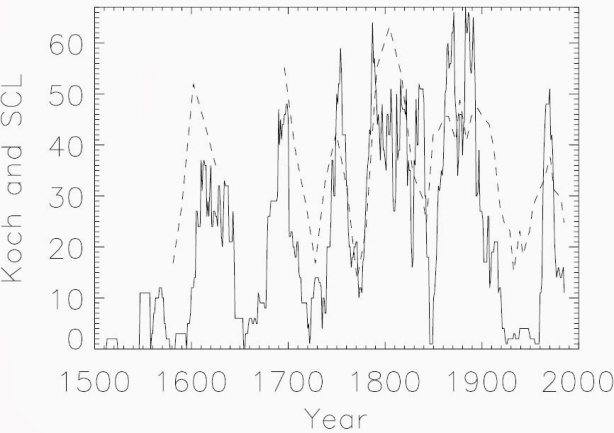 Knud Lassen and Peter Thejll Abstract: The extent of ice in the North Atlantic varies in time with time scales stretching to centennial, and the cause of these variations is discussed. We consider the Koch ice index which describes the amount of ice sighted from Iceland, in the period 1150 to 1983 AD. This measure of ice extent is a non-linear and curtailed measure of the amount of ice in the Greenland Sea, but gives an overall view of the amounts of ice there through more than 800 years. The length of the series allows insight into the natural variability of ice extent and this understanding can be used to evaluate modern-day variations. Thus we find that the recently reported retreat of the ice in the Greenland Sea may be related to the termination of the so-called Little Ice Age in the early twentieth century. We also look at the approximately 80 year variability of the Koch [sea ice] index and compare it to the similar periodicity found in the solar cycle length, which is a measure of solar activity. A close correlation (R=0.67) of high significance (0.5 % probability of a chance occurrence) is found between the two patterns, suggesting a link from solar activity to the Arctic Ocean climate. Paper link: www.dmi.dk/dmi/sr05-02.pdfThe oceans continue to warm. Even Tisdale is having to prepare for another jump in global sea surface temperature. Warming? - not in the last decade: HADSST2 global sea surface anomaly:  HADSST3 global sea surface anomaly:  HADSST2 Northern Hemisphere sea surface anomaly:  HADSST2 Southern Hemisphere sea surface anomaly:  HADSST3 Northern Hemisphere sea surface anomaly:  HADSST3 Southern Hemisphere sea surface anomaly:  |
|
|
|
Post by icefisher on Aug 13, 2013 10:12:28 GMT
"This is just the pattern we should expect if the sun controls these changes." Oh dear! "The deep minimum of 2008 (maybe aided by negative feedback from ice loss) created the increase in volume in 2008. This time we are at solar maximum and we have a volume increase 5 years later. Ocean momentum may be playing out and solar maximum is less than the average solar conditions for the past 260 years. " So why didn't it increase in 2007 and 2012? Rather the opposite happened. Come on, there's absolutely no correlation with the Sun. If a quiet Sun led to ice gain then the Arctic should have reached record lows in the 80s, not the late 00s when solar activity has been low. What we are observing is consistent with less greenhouse gas forcing. As you can see overall extent has not changed since 2007. Here we can see that really ice extent in the Arctic has not changed since 2007. Its flat since then. 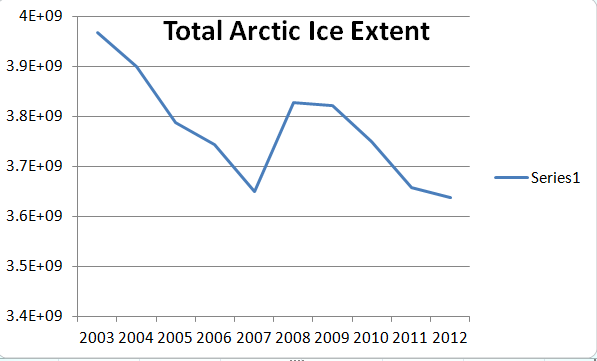 How can that be!!! Socold scratches his head and ponders, dang I saw a record low in 2012 he says!!!!! Well last I checked a summer low can be just weather, looking at year round extent gives us a better measure of CLIMATE!!!! So what is the explanation that puzzles you so??? Here we can see the "cold" seasons show arctic ice extent rapidly increasing since 2004 essentially in time (one year delay) from when the oceans started cooling. 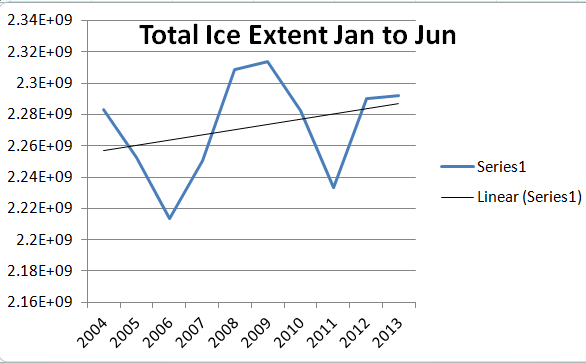 The correct title for the above graph is: Total Arctic Ice Extent Jan 1 to Jun 25 The correct title for the above graph is: Total Arctic Ice Extent Jan 1 to Jun 25So the record low for 2012 is nothing but a weather event! With a superior climate view of annual totals nothing unusual is going on in the Arctic any longer. As far as the 1987 solar peak goes. . . .Emeritus Professor and Founder of the Arctic Research Center Dr Syun Akasofu says the LIA recovery is not the only natural variability that the arctic experiences. His opinion is echoed by many scientists. So the name of the game is WATCH and SEE. Try to avoid panic! There is no boogie man under your bed! All is normal! This stuff just happens and just because you haven't been around to see it before, there is a lot of evidence in the paleo records to say this has happened before. |
|
|
|
Post by sigurdur on Aug 13, 2013 15:27:33 GMT
The current ice level in the Arctic is not abnormal. The state of continuous lack of a melt season during the early 70's was abnormal.
|
|
|
|
Post by icefisher on Aug 13, 2013 17:11:35 GMT
The current ice level in the Arctic is not abnormal. The state of continuous lack of a melt season during the early 70's was abnormal. And that is exactly what Stephen Schneider was telling us in the 1970's before he changed his mind and decided it was normal. . . .uh . . . .whats normal? Er. . . .I forget. . . .my dog ate the raw data. |
|
|
|
Post by socold on Aug 13, 2013 19:06:36 GMT
|
|
|
|
Post by Andrew on Aug 13, 2013 19:22:52 GMT
It was always going to be interesting to see how you guys would manage to avoid the pain and agony of failure, when for you the future was already known and never doubted. One possibility is that you will holding little soirees in the future where you make presentations of 2012 saying 'we are here'  |
|
|
|
Post by socold on Aug 13, 2013 19:38:26 GMT
The only thing failing is Arctic Sea Ice. Get back to me when it actually stabilizes for a substantial length of time, eg 5 years. If it goes up for 1 or two years but overall keeps falling we can't have this ridiculous situation where you guys alternate between silence and claiming it's recovering. Don't you feel even slightly guilty for wrongly claiming sea ice was recovering after 2007 only to have seen it plummet even further?
Just to correct your perceptions, here's what Tamino had to say last November:
"But I don’t expect 2013 to break the 2012 record, in fact I don’t expect the 2012 record to be broken until 2015 or 2016, and possibly even a few years later. That’s the nature of fluctuation, even when the trend continues."
|
|
|
|
Post by glennkoks on Aug 13, 2013 20:14:50 GMT
"This is just the pattern we should expect if the sun controls these changes." Oh dear! "The deep minimum of 2008 (maybe aided by negative feedback from ice loss) created the increase in volume in 2008. This time we are at solar maximum and we have a volume increase 5 years later. Ocean momentum may be playing out and solar maximum is less than the average solar conditions for the past 260 years. " So why didn't it increase in 2007 and 2012? Rather the opposite happened. Come on, there's absolutely no correlation with the Sun. If a quiet Sun led to ice gain then the Arctic should have reached record lows in the 80s, not the late 00s when solar activity has been low. The oceans continue to warm. Even Tisdale is having to prepare for another jump in global sea surface temperature. Socold, The summer solstice and the longest day of the year is in June. Yet the peak of summer happens months later. The effect of these changes takes time. Do you think the correlation between the LIA and Maunder Minimum was an accident? And to say there is absolutely no correlation with the sun is way off base. The sun's effect may or may not be overstated by many of the regulars on these boards but I think it is safe to say the sun plays a rather large roll. |
|
|
|
Post by icefisher on Aug 13, 2013 23:19:49 GMT
The only thing failing is Arctic Sea Ice. Get back to me when it actually stabilizes for a substantial length of time, eg 5 years. If it goes up for 1 or two years but overall keeps falling we can't have this ridiculous situation where you guys alternate between silence and claiming it's recovering. Don't you feel even slightly guilty for wrongly claiming sea ice was recovering after 2007 only to have seen it plummet even further? Just to correct your perceptions, here's what Tamino had to say last November: "But I don’t expect 2013 to break the 2012 record, in fact I don’t expect the 2012 record to be broken until 2015 or 2016, and possibly even a few years later. That’s the nature of fluctuation, even when the trend continues." thats just the same tired old excuses we heard for years after global climate stopped warming. It started out at 5 years too, then became 6, then 7, it has to be 17 now. Climate has been cooling for more than 11 years, flat for 16 years. The ice is not going to just keep zoning out doing its own thing. Its a big system and we don't understand how it works and that very definitely means we don't know how it works which means all you can say is ice extent has fallen. But by the larger measure of average annual ice extent the ice has been flat for 5 years already. So I am getting back to you as you just stated you want 5 years of stabilization. Want to go for 6 now and bet on what 2013 comes in as?  Dalton Minimum Progression: Minimum introducing low solar cycle number 1. . . .knock the ever living snot out of the ocean momentum resulting from the 18th century solar reawakening. Minimum introducing low solar cycle number 2. . . .knock the ever living snot out of global average temperatures. |
|
|
|
Post by douglavers on Aug 13, 2013 23:31:48 GMT
ocean.dmi.dk/arctic/meant80n.uk.phpSorry about my lack of image - I still have'nt mastered the technology. If the decline continues, the refreeze will soon start. Another thought - all that ice still floating around means that the water must be at, or close to, freezing across most of the Arctic. Not much cooling will be needed to restart the ice maker.
|
|
|
|
Post by cuttydyer on Aug 14, 2013 11:50:35 GMT
I predict the sudden return of a couple of our recently absent forum members...  COI is showing a sudden drop off in ice extent, similar to that of 2012. The Arctic remains unusually cold: 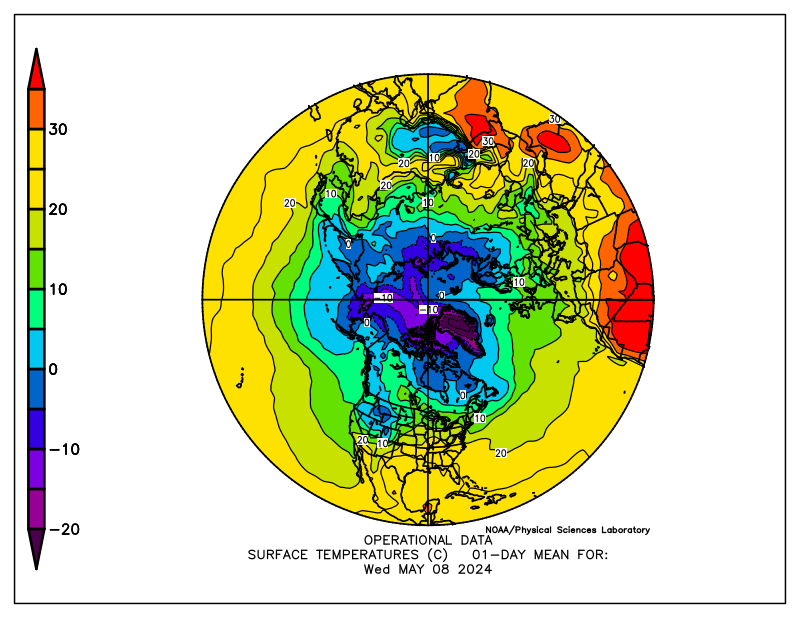 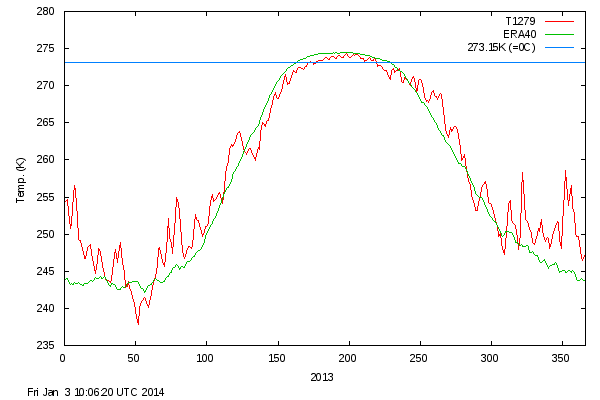 |
|
|
|
Post by throttleup on Aug 14, 2013 14:42:55 GMT
Cutty, your post above begs the question: Which is more "important" (to those who follow it religiously):
Arctic Ice extent/volume/area/color/whatever or Arctic Temperatures?
That is, what if you get one, but not the other?
|
|
|
|
Post by throttleup on Aug 14, 2013 14:47:15 GMT
Oh, and about that Arctic ice extent drop... I wouldn't fret much about it.
From what I've read in some quarters it means certain DOOM for the planet.
No worries.
Have a nice day! 
|
|
|
|
Post by magellan on Aug 15, 2013 5:07:10 GMT
I predict the sudden return of a couple of our recently absent forum members...  COI is showing a sudden drop off in ice extent, similar to that of 2012. The Arctic remains unusually cold:   Neven just soiled his pants...... |
|